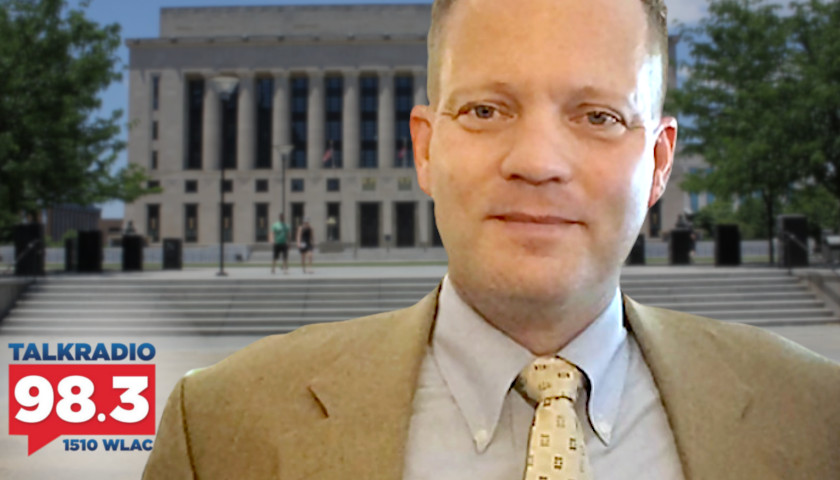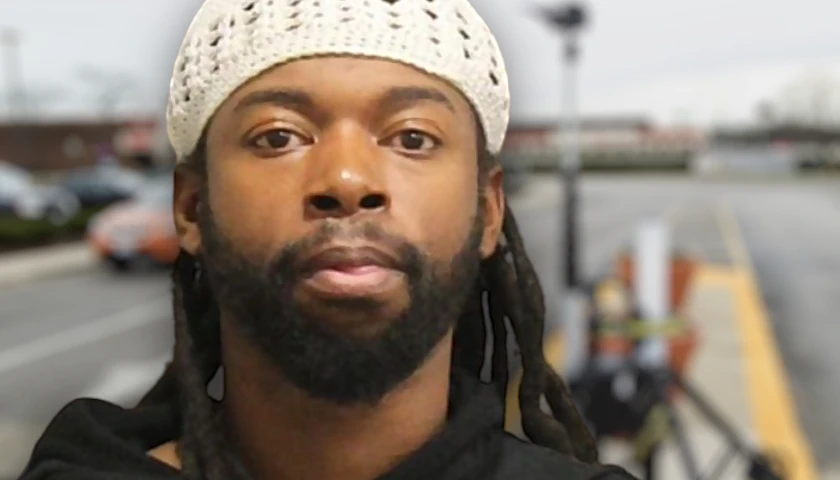Live from Music Row Friday morning on The Tennessee Star Report with Michael Patrick Leahy – broadcast on Nashville’s Talk Radio 98.3 and 1510 WLAC weekdays from 5:00 a.m. to 8:00 a.m. – host Leahy welcomed Nashville attorney Jim Roberts to the newsmakers line.
During the third hour, Roberts updated The Tennessee Star Report with the number of petitions received and still to go for next week’s submission to the Metro Clerk’s office. He was confident that they would reach their goal amount of 20,000 signatures by next Thursday.
Leahy: We are in the studio with the original all-star panelist Crom Carmichael. And on the line our good friend attorney Jim Roberts who’s going to tell us the latest on the Nashville Taxpayer Protection Act. Good morning Jim.
Roberts: Good morning sir. How are you doing this beautiful day?
Leahy: We’re doing as well as can be expected given the fact that 2020 is a crazy year. But you Jim are doing something to bring sanity into this crazy world. Tell us about the Nashville Taxpayer Protection Act. You are trying to get a certain number of signatures so that you can get this charter amendment up for a vote. Where are we?
Roberts: We are doing great actually. We are at a little over 16,000 signatures for the moment. And we only need about 11,000 to get on the ballot. But you want to have an extra margin in case they start to nitpick the signatures and not everybody signs exactly like they are supposed to. We are going to wait till we have about 20,000 signatures which we should have next week. Then we’ll turn them in and get this on the ballot.
Leahy: Great.
Carmichael: The voters should weigh in on this question. And Jim what you are doing is great great work; it’s what America is all bout. It’s what our Democratic process is all about.
Leahy: Describe if you will what your proposal is and what will happen in the timeline here.
Roberts: It is actually called the Nashville Taxpayer Protection Act and it does a couple of things. But one of the things it does is it repeals the 34 percent property tax increase and limits the amount they can raise it each year without going to the people.
The idea is that people should decide whether there should be a big tax increase like this. It does some other things like limit the use of bond funding. Limit the ability of Metro to give away land to billionaires and developers at the expense of taxpayers. It’s to really reign in some of Nashville’s fiscal irresponsibility that we’ve been subject to for the last 10 years. We’re trying to stop Nashville from going bankrupt.
Carmichael: Is it one question with kind of these multiple parts all of one so if you vote ‘yes’ then it does all of those things?
Roberts: Yes it does. We decided to do this as a slate basically. These are just what I call good government ideas.
Carmichael: I just am trying to picture what it will look like on the ballot. So what you are saying is that its a single question that has three or four parts all of which makes sense. As you said, you could call keeping “Nashville from Going Bankrupt Act.” (Laughter)
Roberts: The Nashville Taxpayer Protection Act was hard enough to say. I didn’t want to make it more difficult. (Leahy laughs)
Carmichael: I’m with you. So it’s one question that has like three parts all of which are very similar in nature. So if that’s on the ballot and people go an vote yes then the 34 percent is repealed and these other things all kick in?
Roberts: That’s right. It also strengthens the Open Records Act so people can keep a closer eye on what Metro is doing. It’s not particularly controversial. It’s not a liberal idea or a conservative idea. It’s really just sort of a good government idea.
Carmichael: I don’t know if you were listening earlier but a lady named Paula called in and she was talking about the overreach of the state by this new edict or whatever you want to call it that the governor is putting in that we’re hoping he thinks about that and decides not to do it. But this gets to what you are talking about. There are a lot of good city employees.
A lot of good city employees. But the hierarchy at the very top does not make good long term decisions. You are trying to put institutional constraints in place against bad government decision making. That’s what you are doing. And I can’t tell you how much I appreciate it. And I think they’ll be a significant turnout. I haven’t talked to a single person who thinks that a 34 percent tax increase is good for the city. Not one.
Leahy: Obviously you aren’t talking to the progressive members of the city council. (Laughs)
Carmichael: And they may be alone. (Roberts chuckles) They may be alone in their position. Because I think there are a lot of city employees who live in Davidson County that do not want to see that kind of property tax increase. And also who understand that all it does is make the government of Nashville bigger.
Leahy: Exactly.
Carmichael: And bigger is frankly in government bigger is typically bad.
Leahy: Jim, for our listeners, let’s walk them through what they need to do. They can go to your website at…
Roberts: There are two websites. 4goodgovernment.com and there is thenashvilletaxpayerprotectionact.com will get you there.
Leahy: Let’s say they go to nashvilletaxpayerprotectionact.com. What do they do then?
Roberts: They have an option to download the petition on one side or two sides. I suggest you print it out and get your friends to sign it and mail it back to us.
Leahy: And you’ve got the mailing address on the website and on the petition?
Roberts: We do. We do. It’s written on the petition itself. You can fold it over and mail it.
Leahy: Crom has a comment.
Carmichael: It’s very very important for people that print that out and sign it that they pull out their voter registration card and sign it just like that and that the address is the same address on the voter registration card.
Roberts: That’s right.
Leahy: Isn’t that what determines whether or not it’s a valid signature?
Roberts: The Metro Clerks’ job is to confirm those signatures.
Leahy: You have in your possession now petitions with 16,000 signatures. You said you need more than 11,000 signatures confirmed. Tell us where that 11,000 number comes from.
Roberts: That came from last week’s August 6 election. The number of signatures you have to get is 10 percent of the number of people who voted in the last election. The numbers aren’t final yet. It’s somewhere between 90,000 and 110,000. I’ve heard some different numbers. So I’m going with 11,000 to be conservative. I actually have another 500 petitions sitting on my desk that I haven’t even counted yet. So we may be over 17,000 after today.
Leahy: We’ve gone from 16,000 to 17,000 in just 15 minutes. We are really doing a good job here. (Roberts chuckles)
Carmichael: 20,000 is a good goal. But the more people who sign petitions and send them in that shows your base of support is broad.
Roberts: Absolutely.
Carmichael: I hope you get way over 20,000.
Leahy: Let’s say you get to 20,000 next week, do you have a target date of when you are going to turn these in?
Roberts: We were thinking about next Thursday or Friday quite honestly just to get it going. This is the fun part. Gathering signatures and interacting with people but the truth is we need to get it on the ballot and we need to educate people to come out and vote on this.
Leahy: Let’s walk through this. Let’s say it’s Friday and when you are next week Friday at 7:15 a.m. you’ll tell us. Which I think you are on track to do. If you submit these petitions where do you go to give them? Do you turn them in downtown?
Roberts: I actually go to the Metro Clerk at the courthouse and when they do that they send it over to the election commission.
Leahy: How many boxes are you bringing with these petitions?
Roberts: If you stacked them in it would be about four or five feet high.
Leahy: Can you alert us so we can send our photographer and reporter down to capture this moment?
Roberts: I’d be happy too. We are very excited about it. It’s a lot of petitions and I think they are going to be really impressed when we turn them in.
Leahy: So they get it next Friday the 21st?
Roberts: That’s what we are shooting for.
Leahy: If they get it, what happens next?
Roberts: Well they’ve got to count the signatures. So we hope when we give them 20,000 signatures they are going to know you have it so they aren’t going to nitpick every single signature. We know we’ll have it by then. It goes to the election commission and they certify it to be on the ballot. And it gets put on the ballot and they begin to do the things they do to create an election.
Leahy: And when would that election be?
Roberts: It’s going to be December 5 which is a Saturday believe it or not. We want the maximum amount of people to vote. So we did it on a Saturday.
Leahy: Smart. Very smart. Crom, any final comments for Jim Roberts?
Carmichael: I think this is great. In a country that says it’s free, the people ought to have the right frankly especially at the local should have the right to vote on something of this magnitude.
Listen to the full third hour here:
– – –
Tune in weekdays from 5:00 – 8:00 a.m. to the Tennessee Star Report with Michael Patrick Leahy on Talk Radio 98.3 FM WLAC 1510. Listen online at iHeart Radio.
Background Photo “Nashville City Hall” by Nicolas Henderson. CC BY 2.0.






While you’re at it, protect Tennesseans from REGRESSIVE taxes like the sales tax that refuses to exempt food and medicine. Currently, you screw over working- and poor-class people in favor of a few rich Tennesseans.